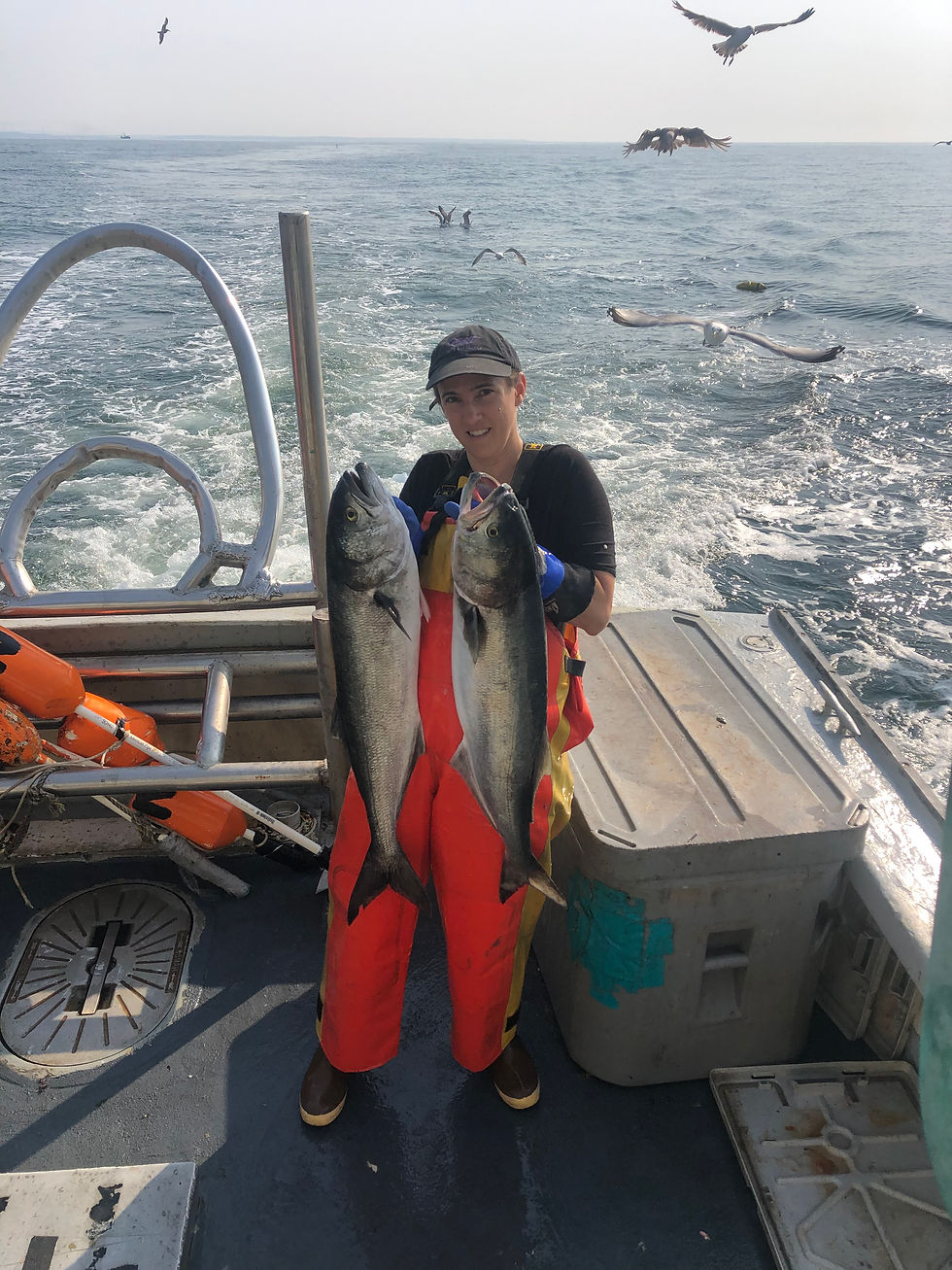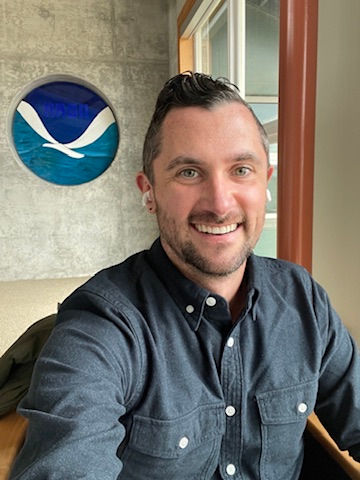Months After Trump’s Firing Of Federal “Climate Proofers”, Millions Are Still At Risk
- Pragathi Ravi

- Aug 21, 2025
- 6 min read
Updated: Aug 26, 2025
Before Sarah Schumann takes her fishing boat out in Rhode Island, she takes a close look at the weather and tidal forecasts. The previous week, when it read 30 knots of wind — which is considered a moderate gale with wind speed equivalent to 32 meters per hour — it meant that it was unsafe to take the boat out.

As a commercial fisherman and a former deckhand, Schumann’s decision to sit the day out and avoid trouble in the sea was dependent on the timely data that the National Oceanic and Atmospheric Administration (NOAA) would put out. For years, the agency’s state-of-the-art models have disbursed user-friendly climatic information for coastal regions, scientifically accurate marine forecasts on tides, currents, water levels and lake levels.
However, to ensure she brings home a good catch, Schumann also needs critical insight from her regional fishery management council, which assesses the fish population in the region and develops management plans to prevent overfishing and rebuild fish stocks. With NOAA’s help, these councils set annual catch limits based on the best available science to ensure a sustainable supply of seafood.
This precarious information ecosystem was threatened when the Department of Government Efficiency, colloquially known as DOGE, set out to cut down “wasteful” public spending by firing as many as 120,000 employees across 18 federal agencies, including NOAA.
DOGE claims to have saved more than $10 billion a week since President Donald Trump entered office by axing grants, contracts and leases; however, a POLITICO analysis of public data and federal spending records last week found that the department has exaggerated its savings by twenty times.
Prior to the cuts, NOAA had a staff of 12,000 globally. The Trump administration axed nearly 20% of its workforce in March in a bid to “reduce U.S. national debt”, and followed up by clawing back funds from NOAA that would have provided financial and technical assistance to coastal states like Rhode Island to prepare for extreme weather, maintained fisheries laboratories, and supported weather forecasting innovations.
Although the nonpartisan Congressional Budget Office estimated late July that Trump’s “big, beautiful bill” will add $3.4 trillion to the U.S. national debt over the next decade, the combined effects of these cuts are already affecting scientists and researchers in the U.S., the ripple effects of which are being felt worldwide.
For Schumann, NOAA’s science formed the bedrock of the fishing community’s actions. However, the link between her, NOAA and the councils was one Matthew Koller. As a science communicator at NOAA, Koller had the tough job of synthesising the information that climate scientists and statisticians at the agency churn out, distilling and communicating it to the regional councils to aid their decisions on fish quota, which would trickle down to fishers such as Schumann.
An average day for Koller would range anywhere between attending meetings with scientists wielding advanced technologies to monitor the oceans or liaising with those enforcing the Marine Mammal Protection Act to ensure they had all the necessary information to make decisions that affected Americans— from the animals they spotted as tourists to the fish they ate. This was unlike the picture of paper-pushing, and resource-wasting bureaucrats that the Musk-Trump tribe had painted the role of many federal officials as; yet in February 2025, he was fired.

After a terse email notified him that his services no longer aligned with that of NOAA’s, he had 90 minutes to clear out his desk at the agency’s Southwest Fisheries Science Centre in Monterey, California and get his affairs in order, which included calling his supervisor to inform him of his termination.
The cascading impact of federal employees such as Koller, being fired was immediate.
When Trump assumed office this year, he initiated a 60-day regulatory freeze that disrupted NOAA’s development of fishery management plans and quota-setting. This meant that the Natural Marine Fishery was unable to close the Atlantic bluefin tuna fishery on time, and it was overfished by 125%, states Elizabeth Lewis, a senior associate attorney at Eubanks & Associates who handles ocean preservation and marine mammal conservation. What this means is when the fishery reopens later this year, the quotes will be reduced to make up for the exceeded quota.
The agency itself touches the lives of every single American, Lewis says, whose love for oceans and marine life at a young age carved her future as a conservation attorney. When the currents are moving, it becomes a challenge for the fishers to know where the whales are migrating. With Koller’s help, these models and forecasts would inform the fishing community what marine mammals such as whales and sea lions, to evade. If these endangered species are not being tracked, we risk pushing them closer to extinction because they can end up as by-catch.
“We are seeing delays in season openings,” Schumann says. NOAA is responsible for issuing seasonal closures published in the Federal Registry, during which no person – whether with a commercial or recreational license — is allowed to fish, until the season opens again.
These disruptions in routine can spell dire financial consequences for the fishing community. Schumann attributes this delay to lack of critical information to decide if the season opening or closing isn’t ready yet. “This means that the data being used is older,” she says, adding that that makes it less certain and reliable. Schumann further states that in a bid to avoid any possible overfishing, the fishery managers will set catch quotas lower than they would otherwise, which spells a forfeited economic opportunity for fishermen.
Koller and his peers at NOAA were also involved importantly in the task of “climate-proofing” the oceans — which meant reducing the uncertainties accompanying climate change. “We have just terminated most of the employees who were working to understand how the climate is affecting 400,000 miles of the coastline,” he says.
Koller also was part of the Climate Ready Fisheries Program that integrated climate modelling, environmental data and projections into fisheries management, which included fish stocks and mammals such as sea lions, whales, etc. The program was just getting off the ground after receiving $349 million in funding allocated by the preceding Biden administration in July 2023. He says all the employees who were working on it were only hired by the government over the past year or two, making them probationary employees, who may all lose their jobs, essentially killing the program.
On August 20th, CNN reported that NOAA has stripped an instrument that would measure ocean color from the next-generation weather and climate satellites it plans to build and launch in the coming decade. The already-contracted instrument would’ve provided insights into fisheries populations, algal blooms, ocean productivity and water quality; it is not clear whether taxpayers will have to shoulder cancellation fees.
Multiple attempts to contact NOAA were met with a standard email that mentioned they remain “dedicated to our mission to provide scientific information and tools necessary for productive, sustainable, and healthy marine ecosystems and coastal communities in our region.” But as per long-standing practice, they are not discussing internal personnel and management matters.
With environmental protection and conservation agencies affected severely due to this purge, experts fear that the ability to rally science and resources to build resilience and adaptation against climate change is being diluted.
But locals have been stepping up. Schumann founded the Fishery Friendly Climate Action Campaign, which is focused on building literacy among the fishing community and nudging them towards climate action. Yet, as someone in the midst of scouting for solutions for transitioning to a low-carbon fleet, she feels a constricted NOAA will breed more uncertainty. “These [firings] will make the system even more bogged down, when it has to be nimble.”
Now a Ocean Research Consultant at the Florida Office of Ocean Economy, Koller says that NOAA’s research has substantially increased our understanding of oceans and how they are going to look in five, ten or twenty years from now. But with an understaffed, underfunded NOAA, communities will struggle to make the informed decisions that have been critical to improving the health of our marine organisms and the people who rely on them.
“We are just going to lose the capacity to deal with future uncertainties.”










